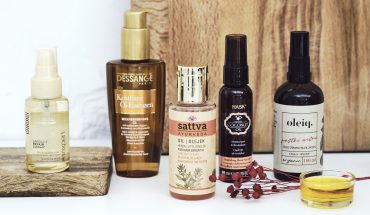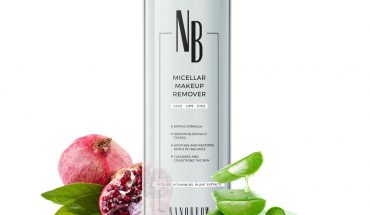First things first, you should know that skin type is written in genes. Secondly, no matter if skin is dry, sensitive or normal, this gene-coded “condition” can be easily disturbed by exposing face to improper beauty treatments, which includes application of ill-matching skincare products. Therefore, being aware of your skin type is extremely important to understand and know how to treat it adequately. However, how to define skin type correctly? What skin types do we actually have? Keep reading to learn how proper skin care should look like.
How to define skin type?
Knowing your skin type gives you the key information concerning the right skincare products you should use and beauty treatments that you should undergo. But how to define what type your skin is? First and foremost, you must keep observing it carefully. Only then will you learn how it behaves when washed with soap, how it reacts to heavy and rich creams, and how it looks in the evening – after the entire day of wearing makeup. Secondly, the way your skin reacts to various weather conditions – especially the sun, wind and dry air – also matters. To be 100% certain, you can ask a dermatologist or a beautician for help.
BASIC SKIN TYPES
Normal skin
Profile: This is skin that is in a really good condition – it’s smooth, soft, resilient, well-supplied with blood, it’s moisture level is adequate and sebum secretion is balanced. It features neither imperfections nor enlarged skin pores (yet, they may appear once in a while). In short, this skin type is well-hydrated and lubricated by nature. Sadly, in most cases, these are kids who haven’t entered their puberty period that are lucky to have this skin type. With age, skin gets more and more dehydrated.
How will I know that my skin is normal? It’s easy. Normal skin is neither reddened nor feels tight when treated with soap water. Additionally, makeup removal and adverse weather conditions don’t trigger any irritation. A rich and heavy face cream is well-tolerated by normal skin type.
Care: Normal skin care should focus on maintaining this very – almost perfect – condition. Delicate and herbal face washes/foams shall make this task easier. Also, don’t refrain from using some protection that includes sunscreens and a moisturizing cream, which in fact should be applied all year.
Oily skin
Profile: Oily skin type equals excessive sebum production, which is also referred to as seborrhea. This skin type is characterized by blemishing shine and enlarged skin pores. Also, oily skin has the tendency to be affected by various forms of acne and have clogged skin pores.
How will I know that my skin is oily? The main and pretty distinctive feature of oily skin is this uncontrolled shine which persists no matter if treated with soap water or exposed to proper makeup removal. Moreover, oily skin doesn’t tolerate heavy and rich creams since it starts producing even more sebum and feels overburdened. Even sun exposure causes seborrhea.
Care: The core of oily skin care includes: cleansing, exfoliation and hydration. What’s important to realize, if you happen to dehydrate oily skin, sebum secretion will double. You should refrain from using skincare products with alcohol because they are responsible for skin dryness and irritation, which again encourages more sebum. Use products with acidic and neutral pH to cleanse oily skin. It’s also a good idea to implement some mineral cosmetics into your daily skincare routine, and these can be cosmetics including kaolin, talc, starch, zinc and copper derivatives. Last but not least, oily skin type would be grateful for being treated with face scrub once in a week. In this way, you will help your oily skin get rid of excess sebum and dead epidermal cells.
Dry skin
Profile: Dry skin produces insufficient amounts of sebum. It’s delicate, fair and matte, its flakes off often. Skin pores are constricted. It rarely features black or whiteheads. Sadly, dry skin is fast to age. What’s interesting, apart from being determined by genes, your skin may become dry as a consequence of you sticking to bad skincare habits.
How will I know that my skin is dry? Firstly, dry skin feels tight when washed with soap water and at the end of a day it is dehydrated and flakes off. Facial milk brings temporary relief to dry skin – it becomes smooth for a moment. Rich and heavy face creams are another skincare products that deliver relief and moisture to dry skin. Additionally, dry skin has problems with changing weather, thus it has an adverse reaction to sun, wind and freezing weather that cause fast dehydration, which consequently leads to redness and prickling sensation.
Care: Cosmetics used to treat dry skin shouldn’t only be able to replenish skin with water but also help it retain this hydration. Dry skin gets well with hyaluronic acid face serums and a natural oil such as argan or avocado oil. Once in a while dry skin should be treated with a gentle scrub, most preferably an enzymatic one.
Sensitive skin
Profile: Sensitive skin is the most delicate and sadly rather troublesome. It reacts to even minor stimulus such as some chemical constituents of skincare products and changing weather conditions. Sensitive skin requires being treated with special products, which also include using a separate group colour cosmetics. People with sensitive skin feel warm cheeks, itchiness, reddens and tight skin. The cause of hypersensitivity might be stress, bad skin care habits, diseases, some medications, toxins and cigarette smoke.
How will I know that my skin is sensitive? Regular skin care practices cause adverse reaction in sensitive skin, which in most cases take the form of discomfort, itchiness, reddens and irritation.
Care: In terms of skin care, sensitive skin is similar to dry skin. You should soothe it by using products containing thermal water. What’s important, sensitive skin care products should contain no more than just a few ingredients max. A shot list of ingredients, non-irritating substances and clinically tested constituents are what sensitive skin should be exposed to. Sun protection is equally essential.






Leave a Reply